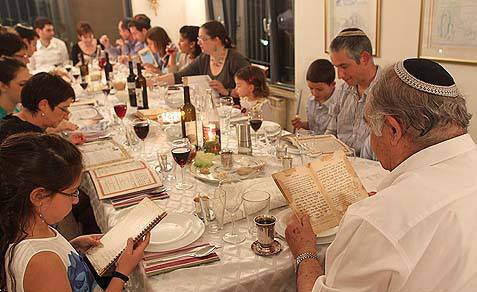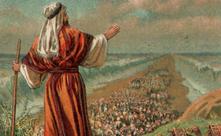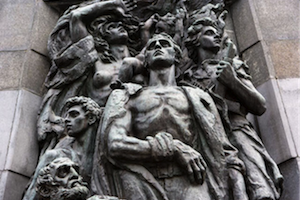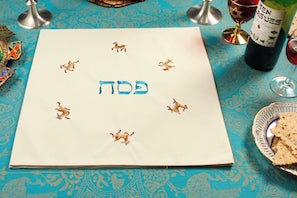Reveal Freedom, Reveal Israel
We come upon the last days of Pesach - 7 or 8 days of recollecting, and celebrating our freedom. How do you feel as this pilgramage holiday comes to a close? Do you feel you have made a journey of your own?

With the seder night at the beginning of the chag, we are immediately thrust from the chaos of the pre-Pesach cleaning right into the celebration of freedom. For many, the seder is the climax and the rest of the chag is more or less an obstacle course of finding the right recipes to get you and your family through the week. And if you’re in Israel, it means outings every day with family and friends as the entire country heads out on vacation.
Essentially, we become so immersed in the festivities that we often forget to reflect upon the meaning of each of the Pesach days. We might even forget to consider that the journey of our ancestors continued towards the Land, just as it does for each of us.
With our freedom, Israel is drawn into a sacred covenant. It is intended as a relationship deeply intimate and founded upon a mutual love. As we gathered around the table to remember and retell this great story of redemption, some skeptical about God and others quite certain, we consider the Biblical commandment: “I will bring you out from under the burdens of the Egyptians, I will rescue you from their bondage, and I will redeem you with an outstretched arm and with great judgments. I will take you as My people….”
In recalling this miracle, every Jewish person is offered the opportunity to come face to face with the process of gaining freedom, its meaning today, our personal relationship with the God of Abraham, Isaac and Jacob, and the journey upon which we embarked in our Exodus.
What transpired over the days that we now honor as Chag Herut Pesach (The Holiday of the Passover Freedom) are described as such:

The children of Israel were liberated from the yoke of their oppressors on the fifteenth day of Nissan, in the year 2448 after the creation of the world. There were 600,000 men over 20 years of age who, with their wives and children, and flocks, crossed the border of Egypt as a free nation.
During the entire period when Moses negotiated with Pharaoh, in the days leading up to the Passover miracle, he asked only that Israel be permitted to travel for three days to offer sacrifices to G‑d. His purpose was to establish Israel as men set free by G‑d rather than slaves set free by Pharaoh.
As they prepared for their departure, Pharaoh knew that they had no intention of returning.Their G‑d, who had performed incredible miracles in Egypt, would feed and sustain them in the wilderness. Nonetheless, Pharaoh thought: "They asked me for no more than three days, so it is as if I still have a hold over them." He therefore dispatched couriers to accompany them and report back to him as to their actions. Israel did not prevent these couriers from going with them. Many Egyptians and other non Israelites joined the triumphant children of Israel, hoping to share their glorious future.
On the morning of the fifteenth of Nisan, all of G‑d's hosts departed from Ramses and on that same day they arrived in a place named Sukos. There the Holy One, blessed is He, encompassed them with seven clouds of glory.
The next day, the sixteenth of Nisan, they traveled from Sukos and encamped at Etam on the edge of the wilderness. Leading the Jewish people on their journey during the day was a pillar of cloud, and at night there was a pillar of fire, giving them light. These Divine messengers not only guided the children of Israel on their way, but also cleared the way before them, making it both easy and safe.On the seventeenth of Nisan, which was Shabbat, they remained encamped.
On Sunday the eighteenth of Nisan, the people of Israel began to prepare their belongings and animals for departure. Pharaoh's couriers said to them: "Your period of freedom has ended, it is time for you to return to Egypt, for you said that you would be going on a three-day journey."
Israel replied: "It was not by Pharaoh's permission that we left Egypt. It was G‑d's exalted Hand that brought us out."
The couriers countered: "Whether you like it or not, in the end you must obey the royal command." Israel rose up against them and struck them, killing some and injuring others. The couriers who remained went back to report to Pharaoh, at midday of the eighteenth of Nisan.
Moses then said to Israel: "Go back toward Egypt so that Pharaoh shall not claim that you are fleeing. Let him catch up with you near his land and, if he has the power to stop you, let him come and stop you." Moses sounded the shofar and the people returned to Pi HaChirot, a day and a half's journey from Egypt.When the blast of the shofar was heard, those with little faith began to tear out their hair and tear their clothes, for they thought that Moses was returning them to Egypt. They were calmed only when Moses told them: "G‑d Himself has told me that you are free men. Our apparent retreat is only to entice the Egyptians and mislead them."
The couriers traveled for a day-and-a-half and at the end of Monday, the nineteenth of Nisan, they came to Pharaoh and informed him that the people had fled.
On Tuesday, the twentieth of Nisan, Pharaoh assembled his chariots and, gathering his nation to accompany him, set out in pursuit of the Children of Israel, catching up to them as they encamped on the banks of the sea.On Wednesday, the seventh night of Pesach, the beginning of the twenty-first of Nisan, Israel entered the sea and in the morning they came out and saw what G‑d's exalted Hand had done to the Egyptians. It was then that Moses and the Children of Israel sang their song of praise.
It was on this very date, eighty-one years before Israel stood on the banks of the Red Sea, that Moses was cast into the river as a result of Pharaoh's edict. The Talmud (Sotah 12b) writes: R. Chanina bar Pappa taught: That day, when the infant Moses was cast into the river, was the twenty-first of Nisan. The ministering angels said to G‑d: "Master of the World, he who is destined to sing the Song of the Sea on this day, shall he be punished on this day?"
On this same date, one year before the Exodus, Moses left Midyan at G‑d's command to take Israel out, for on the fifteenth of Nisan, G‑d had appeared to him from within the bush and urged him for seven days to accept this mission. These seven day are replicated on the very days of the Pesach journey to freedom.
According to the Mechilta commentary, From Our People By Jacob Isaacs,, Kehot Publication Society.
Many don’t realize how the Exodus actually played out. Then, like now, Bnei Yisrael was faced with a threat on one side, fear on another, and nothing but faith and hope in between. And yet then, unlike now, the songs of praise and thanks are on the final day of the journey when their freedom was, finally, secured.
In Israel, the celebrations do continue all throughout the week. For the Sefardim, there is Mimouna. For some Ashkenazim, a tradition of a third seder on the last night of Pesach has even begun to take root. But the majority of Jewish families focus wholly on the seder without recognizing that the next generation for whom we recount the history each year can benefit most from knowing that the seder is truly just the beginning.

Just as we read from the Hagaddah, so too, should we imbue in them an awareness that, for the length of Passover all the way through Shavuot, the Children of Israel are learning about themselves, gaining fresh perspective from their newly-found freedom, and experiencing the challenges and benefits that come from having to accept the yoke of our unique identity and place in the world.
From preparing for Passover to understanding the order of the Seder, from eating the meal of freedom to reenacting the saga at the sea, this fascinating exploration of our history teaches us that our responsibility as Jews in a modern era is no different than that of Bnei Yisrael thousands of years ago. Every day can involve new facts, new experiences, new memories, and new moments of pride in our people, our land, our destiny. And I am eternally proud to be making that possible for Jews across the world through our work at Israel Forever.
Recommended for you:
YOUR ISRAEL CONNECTION FOR PASSOVER
Let us remember where they were headed - the Land of Israel - and appreciate the long road our people endured to reach the Jewish homeland!
About the Author








